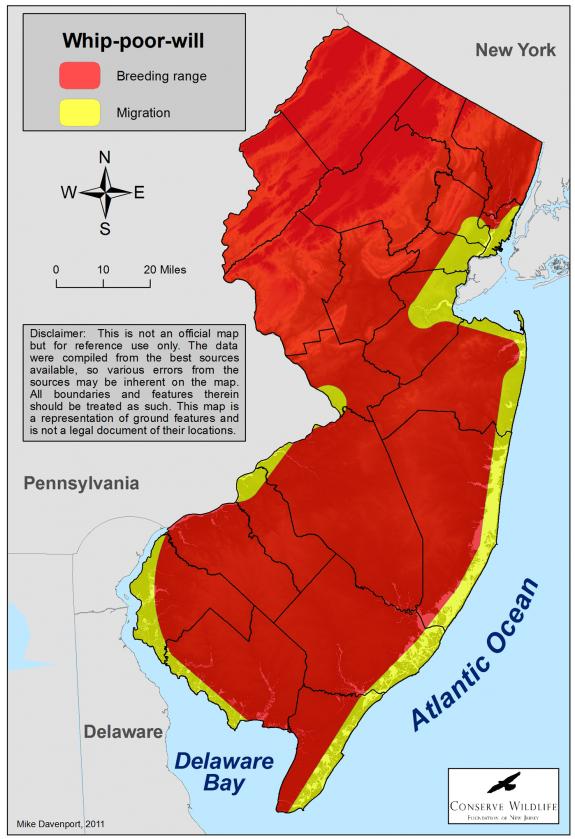Antrostomus vociferus
Type: bird
Status: special concern
Species Guide
Eastern whip-poor-will
Antrostomus vociferus
Species Type: bird
Conservation Status: special concern
IDENTIFICATION
The Eastern whip-poor-will is within a Family of birds known as Caprimulgidae or “goatsuckers”. These largely nocturnal birds were called goatsuckers under the mistaken belief that they fed by suckling on goats during the night. Like all goatsuckers, the whip-poor-will is cryptically camouflaged and has a large head with large eyes and a tiny bill. It is largely gray-brown in color with a white throat.
This species is primarily nocturnal. They are very difficult to see when they are perched since they blend-in so well with their surroundings. In flight, they have rounded wings and a rounded tail. Males have large white tail patches. These patches are buff-colored on females.
Like other goatsuckers, the whip-poor-will is often heard at night. Their call is a repeated, melodious WHIP poor WILL.

Distribution & Habitat
The breeding range of the whip-poor-will includes southeastern Canada, the eastern half of the U.S., and the U.S. southwest. They are year-round residents in central Mexico. They winter in the southeastern U.S., eastern Mexico, and Central America.
Habitat for this species includes forest and open woodland. They nest on the ground, usually under a tree or shrub, on a bed of dead leaves.
Diet
Whip-poor-wills feed on insects which they catch while flying at twilight or during bright moonlight. Their prey consists of flying insects such as moths, mosquitoes, flies, and beetles.
Life Cycle
The breeding season in New Jersey is between early April and late August. Two eggs are typically laid and are incubated by the female with some help from the male. The eggs hatch after about 17-20 days. Their nestlings are semi-precocial and are tended to by both parents which feed them regurgitated insects. The young are ready to fly at 14-20 days after hatching. This species has one or two broods each breeding season.
Current Threats, Status, and Conservation
The whip-poor-will is listed in New Jersey as a Species of Special Concern (not yet endangered or threatened but possibly on its way). Survey data suggests a decline throughout portions of their range. Potential causes may be loss of habitat, forest fragmentation, nest predation, and pesticide use. This species is also potentially impacted by the paving of rural roads since higher road speed leads to a higher incidence of road mortality.
This species is somewhat difficult to survey for since they are crepuscular and camouflaged. Further survey effort will be necessary in order to determine the species’ distribution and population trend in New Jersey.
References
Text written by Michael J. Davenport in 2011.
Scientific Classification
- Kingdom: Animalia
- Phylum: Chordata
- Class: Aves
- Order: Caprimulgiformes
- Family: Caprimulgidae
- Genus: Caprimulgus
- Species: A. vociferus